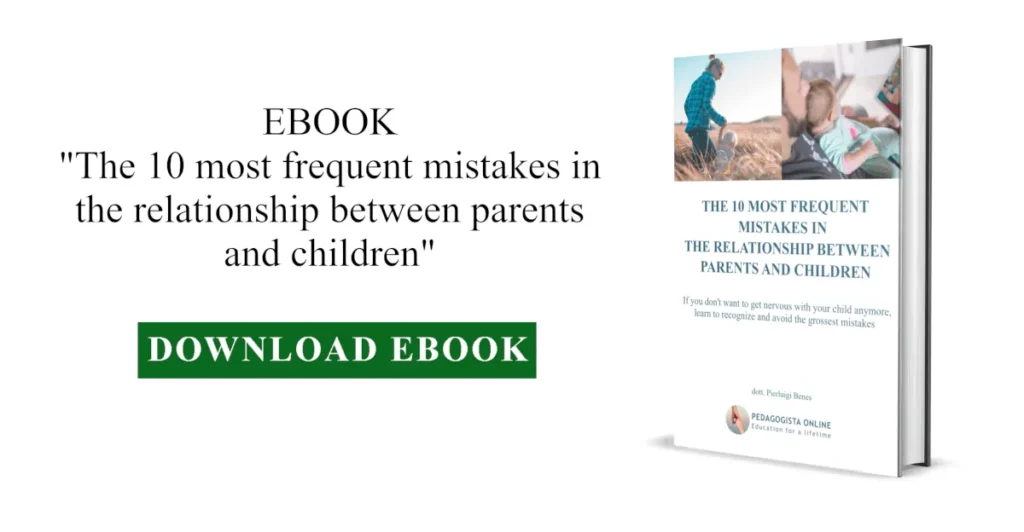Do you think that your teenage son or daughter lacks sufficient emotional independence to face adulthood with adequate strength?
The more you observe how they approach their studies and other commitments in life, the more you doubt their ability to find a job once they finish their studies.
However, when you compare yourself with other parents, you realize that your concerns are shared by others too, and you feel somewhat reassured.
Nevertheless, you want to understand how to help them develop additional skills beyond their academic learning so that they can make the best choices for their life after school.
When you were young, you went through a similar phase, but then you managed to build a life for yourself, and you wish the same for your children. However, you know that the job market is becoming increasingly competitive, and you feel that finding employment is more challenging than it was twenty years ago.
The question you are asking yourself is: what personal skills does my child need to develop to leverage their existing abilities and become independent from the family?
In this regard, I intend to provide you with specific indications about these skills, but, above all, I will give you a strategy to ensure that he/she can make the most of these abilities to the best of their capacities.
1. Emotional independence: what are competences
First of all, you need to remember that the topic of competence is part of a broader framework that also involves two other aspects: knowledge (the know-how) and skills (the know-how-to).
When a person possesses sufficient knowledge (knowing), can apply it to concrete situations (knowing how to use knowledge), and can also generalize the use of that knowledge and those skills in everyday life (personal, academic, work-related, sports-related, etc.), then that person can be considered competent.
Let me give you a straightforward example. If you have studied the Pythagorean theorem, you know that if you construct squares on the three sides of a right-angled triangle, the sum of the areas of those squares built on the two shorter sides is equal to the area of the square constructed on the hypotenuse. You possess knowledge.
If you encounter a math problem involving a right-angled triangle and need to calculate the length of the hypotenuse, you know that you should apply the Pythagorean theorem. In this case, you have developed a skill.
If in your everyday life, while building a triangular-shaped panel, you know that you can refer to the Pythagorean theorem, then you have developed some competence in that subject.
The example I provided doesn’t only apply to math and other school subjects; it is a much broader concept and relates to any kind of skill a person employs in their interactions with the environment they live in.
That environment consists of objects, people, animals, concepts, arts, relationships, etc. All of a person’s skills come into play in each of these aspects. Therefore, put simply, the more a person can master the use of certain knowledge and abilities to solve the problems of their daily life, the more competent they can be considered.
2. How can you develop competences
Competences develop from the moment one is born, and they are cultivated in all aspects of life: at home and with family, at school, in the park, with friends, in sports, and more.
There is a formal context where knowledge and skills are nurtured, that is school. However, the school’s educational offering includes many other activities (field trips, guided tours, theater, etc.) besides what is covered in the school curriculum.
All these activities aim to broaden a student’s opportunities to discover their aptitudes, enabling them to become more competent in facing adulthood.
Besides school, sports also play a crucial role in competence development. I’m not just referring to motor and technical competences specific to a certain discipline; I mean mainly others: experiencing relationships within a group, following the directions of an authority, learning to endure hardship to achieve a goal, sacrificing for the team, and more.
All these aspects hold value in adult life, equal to or even greater than many technical competences. In fact, there are skilled technicians who cannot collaborate with colleagues, isolating their technical competence rather than letting it interact and enrich itself with others’ competences.
All experiences that allow children and teenagers to experiment with their abilities are a precious aid in helping them mature skills that will be essential in life, enabling them to achieve significant results in terms of personal fulfillment.
At this point, I imagine you have a certain interest in understanding which among the many possible competences are particularly useful for your child to become more independent and self-reliant from you.
3. The most important competences required for independence
The first distinction to be made concerns the realm of soft skills (or life skills) and hard skills. Hard skills represent technical and professional competencies, i.e., the skills that each person develops based on their training and professional updating.
In addition to these, there are other skills that are foundational for the exercise of hard skills; these are soft skills, which we could call personal skills: the ability to plan independently, to be flexible and self-confident, etc.
In this regard, two important documents address the theme of personal competences: one was produced by the World Health Organization in 1994, and the other is the result of the work of the European Union in 2018.
The World Health Organization identified three areas that define the following personal skills:
– Emotional competence area: self-awareness, emotion management, stress management.
– Relational competence area: empathy, effective communication, effective relationships.
– Cognitive competence area: problem-solving, decision-making, critical thinking, creative thinking.
As you can see, beyond the perfect design of bridges, the construction of an excellent electrical system, or the preparation of the best desserts on the planet, a person’s potential for achievement depends on other characteristics.
Am I able to make decisions, or do I get lost in trivial matters even when I’m very skilled? Can I effectively solve a problem, or do I create five new problems while trying to solve one? Do I relate adequately to others, or do I expect them to help me in every circumstance, or perhaps I don’t allow them to get involved in my affairs?
Questions like these are essential to understand the level of competence one possesses, as they help identify areas for improvement in order to achieve better results in one’s activities (professional, sports, family-related, etc.).
In more recent years, the EU has defined the 8 key competencies for lifelong learning, aimed at providing guidance to help people enhance their level of mastery in essential skills.
– Functional literacy competence: concerns the ability to use written and oral language to communicate with others and relate effectively.
– Multilingual competence: concerns the ability to adequately use languages other than one’s own to communicate effectively with others.
– Mathematical competence and competence in science, technology, and engineering: concerns a person’s ability to solve problems and understand the world around them.
– Digital competence: concerns the ability to use digital technologies for learning, work, and participation in society.
– Personal, social, and learning-to-learn competence: concerns the ability to work constructively with others and acquire the necessary learning to enrich one’s career.
– Citizenship competence: concerns the ability to participate in civic and social life, reaping all the benefits that come with it.
– Entrepreneurial competence: fundamentally concerns the ability to exploit ideas and seize opportunities to transform them into actions for professional growth.
– Cultural awareness and expression competence: concerns the ability to understand, develop, and express one’s ideas through different cultural forms.
4. The recipe to be emotionally independent
Now that you know the competencies that it would be beneficial for your child to possess in order to enter the adult world with the best opportunities for fulfillment, I want to suggest the most effective mechanism to set these competencies in motion optimally and enable them to develop a good emotional independence.
Independence is the most sought-after condition for a person and is perceived particularly strongly during preadolescence and adolescence. However, to be adequately independent, a person needs, first and foremost, to feel secure and possess a strong sense of self-control.
Self-control matures in the early years of life and is more solid the more the child is provided with the security they need. Therefore, something that helps your child feel more secure, even as a teenager, is knowing that they can turn to you for comfort when they are scared, rather than fearing being ridiculed, judged, or punished.
Furthermore, to feel emotionally independent, a person also needs to be able to confront the world that welcomes them from a privileged position; this advantage stems from the possession of skills and the ability to use them competently.
That’s why school, sports, friends, and all other arenas of confrontation represent essential formative experiences for gaining confidence in one’s abilities.
Finally, having developed good self-control allows the teenager to easily resolve tensions that arise in conflicts and achieve a more harmonious development of their personality.
In conclusion, the synergy between these elements is the factor that makes a teenager more aware of their abilities and skills, and therefore more capable of creating the ideal conditions to become independent.
Being independent doesn’t mean being able to do everything alone; it means being able to decide autonomously and knowing what and who one needs to achieve a specific result. To do this, one needs to know oneself and objectively evaluate one’s strengths and weaknesses.









